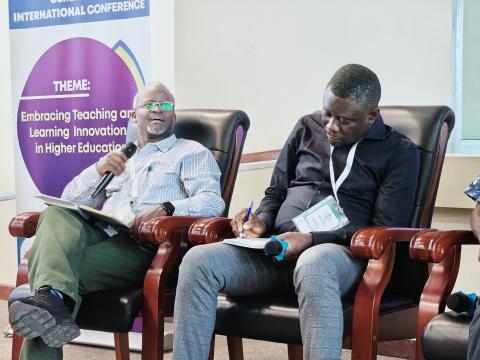
No less than fifteen universities from across Africa convened in Malawi to showcase the potential of media-enhanced courses on migration and their practical applications in addressing the vast demand for higher education on the continent. This initiative is of unprecedented scope.
The Erich-Brost Institute for International Journalism (EBI) at Dortmund University in Germany organized a major e-learning conference in Malawi, focusing on media coverage of migration in Africa. Dortmund University is currently leading a three-year EU-funded project called 'CoMMPASS,' aimed at developing an e-learning platform for future and practicing journalists in African universities.
Over 70 journalism researchers and students from both English- and French-speaking African countries participated in the three-day conference, from 12-15 August 2024 alongside representatives from Portuguese- and Kiswahili-speaking nations. Such a diverse gathering is still a rarity on the African continent. The CoMMPASS online course, currently in a test phase in English in Uganda, Burkina Faso, and Malawi, will be more widely available next year in these four languages. The Dortmund team provided conference participants with an in-depth introduction to the structures of the CoMMPASS e-learning portal, which is currently in its test phase and scheduled to go live in 2025.
Thanks to additional funding from the German Federal Foreign Office, the conference organizers—Prof. Dr. Susanne Fengler, Professor of International Journalism at Dortmund University and Director of the Erich-Brost Institute, and Dr. Michel Leroy, Project Manager of the Erasmus+ CoMMPASS project—were able to bring together colleagues from all over the continent at MUBAS, the host university in Malawi’s largest city, Blantyre. Delegates came from countries as diverse as Burkina Faso, Cameroon, the Democratic Republic of Congo, Ethiopia, Ghana, Kenya, Malawi, Nigeria, Senegal, South Africa, Tanzania and Uganda, to name but a few.
Prof. Dr. Susanne Fengler noted in her keynote address, “Investing in the education of young journalists is of paramount importance for African countries. Particularly in view of the rapid population growth, Africa’s often politically fragile states are being tested. Jobs and healthcare are becoming even scarcer. Meanwhile, press freedom is restricted in many African countries. Now, more than ever, African nations need critical public debate on how to address these challenges. This will only be possible if there are enough professionally trained journalists and independent newsrooms. This is where we aim to make a contribution.”
Another keynote speaker, Prof. Dr. Sisanda Bukeka Nkoala, from the University of the Western Cape, gave a remarkable speech entitled ‘Embracing Innovation in Higher Education Institutions in Sub-Saharan Africa: Challenges and Enablers’. Prof. Dr. Nkoala also serves as General Secretary of the African Journalism Education Network (AJEN), a network that takes a leading interest in the issue of appropriating these new teaching tools.
Makerere University is one of the partner institutions that was represented by Dr. William Tayeebwa who is a Principal Investigator on the CoMMPASS project. During the Conference, Dr. Tayeebwa chaired the panel on Fostering an African narrative to teach migration in Africa. Moreover, Dr. Fred Kakooza, the Local Implementation Coordinator of the CoMMPASS project at Makerere University, presented a paper on the Utilization of Digital Media Platforms by University Students in Uganda during a panel discussion on African journalism educators and new didactic approaches: new media and new challenges?
The conference also featured intensive discussions about the varying conditions for e-learning across African countries. While nations like Kenya and Nigeria are digital pioneers, already incorporating digital teaching formats, educators and students in other African countries face challenges such as high internet costs, frequent power outages, and a lack of adequate space for focused online study in cramped living conditions. The African journalism educators exchanged experiences and explored potential solutions to these issues.
- Log in to post comments




